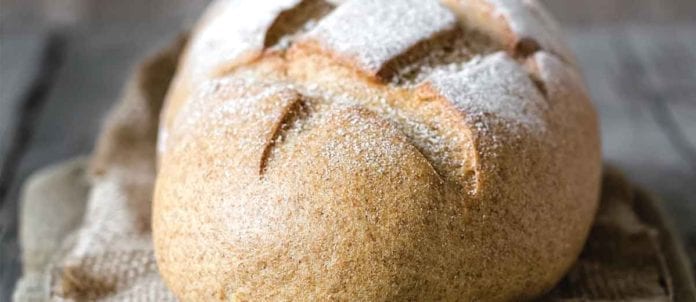Modern wheat, along with its processing method, has been accused of causing wheat and/or gluten sensitivities. In fact, according to the 2016 Taste Tomorrow study conducted by Toronto-based Puratos, 31 per cent of Canadian consumers believe gluten can cause digestive problems. The study also highlighted Canadians’ negative feelings about the quality of food and the way it’s produced. “People are not sure what the industry is doing in terms of producing foods or making breads and cakes,” says Liesbet Vandepoel, director of Marketing at Puratos. “What they’re looking for is transparency.” And in this quest for transparency, she says, claims such as “no added preservatives” or “all natural” have the greatest impact on consumers.
Full-service restaurants have certainly taken notice of the growing demand for ancient grain breads, though this is still in the process of filtering down to the QSR level.
LESSONS FROM THE PAST
Together, these factors have given rise to the modern popularity of ancient grains. Vandepoel explains that Canadians view ingredients such as nuts, seeds and ancient grains as fundamentally natural. “We are [also] seeing more grains and seeds that are considered gluten-free used more frequently in bakery applications.” But, she cautions, not all ancient grains are gluten-free. Quebec-based Spiffy Bake Shop (a brand under Maison Cannelle Group), specializes in making breads from gluten-free ancient grains — sorghum, quinoa and brown rice flours are staples in the company’s flour blends.
Frederic Blaise, Spiffy’s CEO, says with 22 per cent of Canadians actively seeking gluten-free products, giving foodservice operators an opportunity to embrace gluten-free preferences and make a strong impression with quality offerings is key to his business. “[Gluten-free] is almost following the path of probiotic yogurts and other ingredients that increase digestive comfort,” says Blaise. “At the end of the day, two-thirds of Canadians are experiencing digestive discomfort every single day…not because they’re celiac, but it may come down compositionally to their microbiota.”
Health, texture and taste are at the core of Spiffy’s philosophy, which is why nutrient-dense ancient grains play a key role in its breads. The company’s products are also GMO- and preservative-free, which means its products are best kept frozen, but as Blaise quips “frozen is the new fresh.” The Taste Tomorrow study supports this sentiment, reporting 45 per cent of Canadians store their bread in the freezer in order to preserve freshness. The brand’s white-bread-like quinoa loaf is particularly popular with clients such as Ritz-Carlton Montreal. Spiffy also provides bread and other products — including dinner rolls, pizza dough and burger buns — to clients such as Sofitel, Hotel Germain and Pizza Salvatore. Blaise says Spiffy’s clients come to them because they “turn gluten-free into more of an opportunity and less of a nightmare.”
A LOT OF DOUGH
Maintaining a restaurant’s bread program in-house is no small endeavour. At Beaumont, Alta.-based Chartier, chef Steve Brochu and his team produce a selection of breads and pastries for both the restaurant and its bread window, which offers fresh-made delicacies Wednesday through Sunday.
Chartier is a French-Canadian restaurant concept that opened this spring and its bread has quickly become a local staple. “It was important to Darren and Sylvia [Cheverie] (the restaurant’s owners) that we have good bread to stand on, because it brings people together in French-Canadian food as much as anything,” explains Brochu.
Chartier’s kitchen bakes a variety of breads, including whole wheat, sourdough, sourdough-rye, ciabatta, brioche, baguettes and potato rolls. Brochu notes it chose to stick with what was popular and familiar when developing the restaurant’s bread offerings. “We’re in a rural town in Alberta so we didn’t want to do anything too crazy to scare people away right out of the gate. [So we stuck] to a standard rundown of breads they’re familiar with.” The breads also had to make sense within the context of Chartier’s French-Canadian concept, he adds.
The size of their operation can also be limiting. “Our bread program has almost reached capacity…we’re not a bakery, we’re a restaurant that happens to have a Hobart mixer and a bread oven in the corner,” Brochu says with a chuckle. “We stomp out a ton of bread. It takes us eight hours and one or two devoted bakers; we have to account for a lot of time and energy.” The fruit of this labour is served in bread trays with butter and salted herbs ($5), made into sourdough croutons to accompany salmon ceviche ($14), used for smoked-meat sandwiches ($15) or sold as whole loaves. House-made English muffins and sourdough also feature prominently on the restaurant’s brunch menu.
Constraints on time and space have prevented Chartier from delving into producing gluten-free bread offerings, however, the restaurant’s gluten-free diners do not go without. Gluten-free bread produced by Edmonton-based Kinnikinnick Foods Inc. is also available. “We get a gluten-free flour and on Wednesdays when we do fish and chips night, our batter is all gluten-free,” Brochu adds.
Chartier dedicates a large portion of its social-media feeds to promoting its bread and baked goods, an approach which Brochu says has a significant impact on sales. The restaurant is also very transparent about its bread program. “The bread window looks right into our kitchen,” explains Brochu. “People can see our [dough] rising for hours overnight because it is right in front of the window.”
THE ART OF BREAD
Artisanal products have an undeniable cachet with customers, but in-house production is not the only way to add that level of quality to a restaurant’s bread basket. Toronto-based Blackbird Baking Co. has made a name for itself by providing artisanal bread products to some of the city’s top restaurants. Among the bakery’s approximately 50 wholesale accounts, Blackbird boasts clients such as Alo, The Black Hoof, Momofuku, Bar Volo and Loka — along with high-end retailers such as Pusateri’s Fine Foods and McEwan grocery stores.
In the six years since it opened, Blackbird has grown to a three-shifts-per-day, seven-days-a-week operation with more than 30 employees. It also introduced a retail location in Kensington Market. “Customers who come to us are looking for consistently high-quality, hand-crafted breads,” says the company’s founder Simon Blackwell. “The majority of our restaurant accounts are interested in variety — baguettes, sourdough, focaccia and buns.” This is just a small sampling of the breads produced by the company, though Blackwell says the bakery’s sourdough varieties are among its most popular.
Blackbird makes use of a wide range of grains for its flours, including whole wheat, whole spelt, Kamut, red fife, whole rye, pastry flour and unbleached all-purpose flour — all of which are sourced from local mills. “These flours are certified organic, locally grown, milled and delivered fresh to us so they are full of flavour and are nutrient rich,” Blackwell explains. “Our breads would not be the same if we were not working with these smaller local mills.” Blackwell also says the majority of its breads are made with flour blends using unbleached all-purpose and whole-grain flours sourced from Gorrie, Ont.-based Hoffnug Mills and Parrish & Heimbecker in Hamilton, Ont., respectively.
At the end of the day, both Blackwell and Brochu agree, people are looking for “better quality” breads. “[There is] a demand from the public for better breads,” says Blackwell. “Sliced supermarket bread, made quickly with commercial yeast, is absolutely everywhere now. I think people are looking for a higher-quality product that someone has taken time and care to produce.”
Puratos’ Vandepoel believes the Taste Tomorrow findings support this theory. She recommends restaurants highlight the story behind the breads it serves. “It’s good to talk about the ingredients used and who has made the bread…it gives the consumer that trust in the quality of the product.”


















